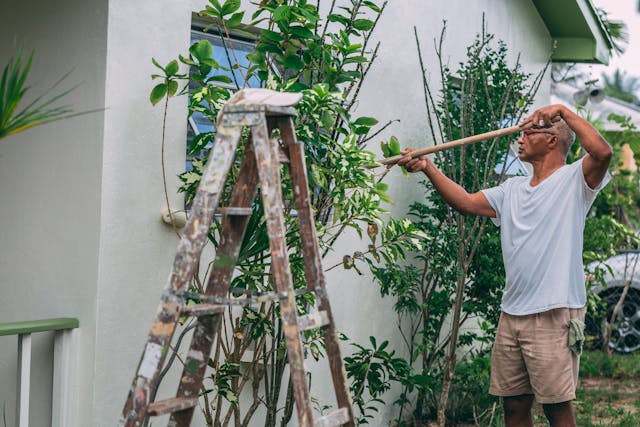Owning your first home is exciting, but it comes with responsibilities that can feel overwhelming. Regular maintenance preserves your property’s value and ensures your living environment remains safe and comfortable. Many first-time homeowners focus on immediate needs and often overlook small, routine tasks that prevent bigger problems later.
By incorporating simple habits into your schedule, you can avoid costly repairs, extend the life of your home’s systems, and enjoy peace of mind. This guide highlights practical and easy-to-follow home maintenance tips that make homeownership more manageable and less stressful.

Inspecting and Cleaning Gutters
Gutters play a crucial role in directing rainwater away from your home to prevent water damage to your roof and foundation. For first-time homeowners, it is important to schedule gutter inspections to prevent roofing issues at least twice a year, particularly in spring and fall. Professionals can remove leaves, debris, and any blockages that can lead to overflowing water.
Check for signs of leaks, rust, or loose brackets that may require minor repairs. Using a sturdy ladder and gloves makes the process safer, and installing gutter guards can reduce long-term maintenance. Keeping gutters in good condition protects your home from water damage and helps maintain the exterior’s structural integrity.
Maintaining HVAC Systems
Heating, ventilation, and air conditioning systems require regular attention to function efficiently. Change air filters every one to three months to improve air quality and reduce strain on the system. Schedule annual professional inspections to check for refrigerant levels, leaks, and system performance.
Cleaning vents and ensuring unobstructed airflow enhances comfort while lowering energy bills. For first-time homeowners unfamiliar with HVAC systems, basic preventive care prevents breakdowns during extreme weather. Understanding how to operate thermostats properly and recognizing early warning signs can extend the lifespan of your equipment and ensure a healthier living environment.
Checking Plumbing and Fixtures
Plumbing issues can quickly escalate into costly repairs if left unaddressed. Regularly inspect visible pipes for leaks, corrosion, or water damage. Test faucets, showers, and toilets to ensure they are functioning properly and not wasting water.
Small fixes like tightening connections or replacing washers can prevent larger problems. First-time homeowners should familiarize themselves with the location of the main water shut-off valve to handle emergencies efficiently.
Drains should be cleaned periodically to avoid clogs, and investing in drain strainers can minimize debris accumulation. Consistent attention to plumbing maintains household functionality and prevents unexpected repair costs.
Roof and Attic Care
Your roof protects the entire home, so early maintenance can prevent significant damage. Look for missing, damaged, or curling shingles after storms and inspect flashing around chimneys and vents. Attic care is equally important, as proper insulation and ventilation prevent mold growth and reduce energy costs.
Check for signs of leaks, water stains, or pest infestations, which are easier to address when caught early. First-time homeowners should consider professional roof inspections every few years if their property has older roofing. Maintaining the roof and attic safeguards your home’s structural integrity and contributes to long-term energy efficiency.
Exterior Maintenance and Landscaping
A well-maintained exterior enhances curb appeal and protects your home from environmental damage. Power wash siding, trim, and driveways to remove dirt and mildew. Inspect paint and sealants for peeling or cracks and apply touch-ups as needed to prevent water intrusion. Trim trees and shrubs to reduce the risk of falling branches damaging the roof or siding.
First-time homeowners should plan landscaping with proper drainage in mind to prevent water pooling near the foundation. Keeping the exterior in good condition improves aesthetics and extends the life of structural materials, and supports a safe outdoor environment.
Routine Appliance Care
Household appliances require consistent upkeep to function efficiently and last longer. Clean refrigerator coils, oven burners, and dryer vents to prevent fire hazards and maintain optimal performance. Check for unusual noises, leaks, or temperature inconsistencies, which may indicate the need for service.
Regularly descaling coffee makers, water heaters, and other appliances preserves their longevity. For first-time homeowners, keeping a schedule or checklist of maintenance tasks ensures appliances remain reliable. Proper care minimizes costly replacements, supports energy efficiency, and keeps daily life running smoothly without unexpected interruptions.

Homeownership brings pride and responsibility, and adopting a proactive approach to maintenance can make a significant difference. By inspecting gutters, caring for HVAC systems, checking plumbing, maintaining the roof and attic, tending to the exterior, and keeping appliances in good condition, first-time homeowners can prevent common issues and reduce repair expenses.
Creating a routine that addresses these tasks ensures the home remains safe, comfortable, and efficient. Developing these habits early on builds confidence, protects your investment, and allows you to enjoy the rewards of homeownership with less stress and greater peace of mind.


